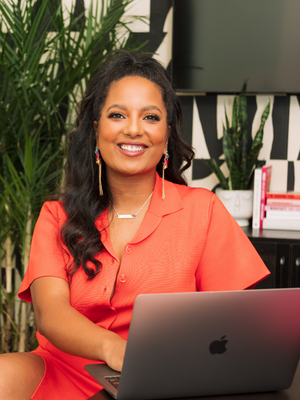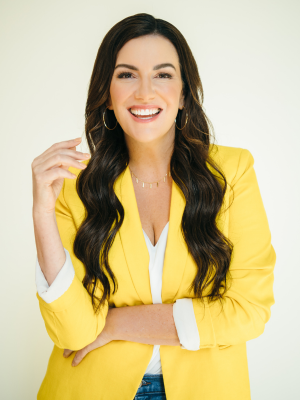 “For me, my mission is sowing into people. If I can impact a person and help open them up to who they really are, their strengths and what they’re capable of, and support them, this has ripple effects,” says Sherin Dawud. “Often companies and organizations are driven by the bottom line, and the bottom line is your people. Money is just a byproduct.”
“For me, my mission is sowing into people. If I can impact a person and help open them up to who they really are, their strengths and what they’re capable of, and support them, this has ripple effects,” says Sherin Dawud. “Often companies and organizations are driven by the bottom line, and the bottom line is your people. Money is just a byproduct.”
Social Impact IS the Bottom Line
“As a child, my mom was huge on service to the community. And it was because we came from a low-income family in which we relied on donations for Christmas gifts and jackets and meals,” says Dawud, who grew up in Northern Louisiana. “As we became better-off, it was a repayment to serve the community. My parents instilled this deep in me, and I’ve always had a heart for serving people.”
Along with her co-founder and business partner Raina Vallot, Dawud has been carving her leadership path based on prioritizing social impact in both the non-profit and business world in Louisiana.
Power Pump Girls, Inc. is the duo’s non-profit 501 C3, a social impact club whose mission is to empower women to connect and serve. One of the key initiatives since 2018 focuses on menstrual equity to address the issue of period poverty. Those who do not have access to period care products – either through inability to access or afford – often resort to homemade solutions, resulting in damaging impacts on health and self-esteem. The team provides dignity, education and products (pads, cups, liners, tampons) to those who lack access – from women on the street, to girls missing school, to those who are incarcerated. Across several partnerships with organizations, Power Pump Girls has distributed many tens of thousands of products to the community. They’ve also advocated successfully to have the pink tax (the tax on feminine care products, diapers and other predominantly female purchases) removed statewide. Based in the hurricane, flood and tornado prone areas of southern Louisiana, Power Pump Girls also focuses on disaster relief and promotes civic engagement among women in the capital voting district of Baton Rouge.
But social impact is not only for non-profit work. As “social innovators” who are “fueled by servant leadership,” Dawud’s and Vallot’s marketing and impact consultancy Nura Co won’t accept projects from organizations unless they are focused on impact for people within the organization or the community because as Dawud puts it, “we will not be passionate about your work.”
Instead, they help organizations who are either seeking support for social impact initiatives or consultancy on creating more ways to serve or grow people.
Leaving to Lead On Her Terms
Going into agency life after graduating in 2012, Dawud was disillusioned, but not dissuaded, by her early experience in the workplace. Not only did she feel the culture lacked the inclusiveness she craved, which led her to begin an employee resource group (ERG), but she found her own leadership style rubbed up against the status quo.
“The environment wasn’t conducive to my leadership style. While I am a very firm woman, I am definitely compassionate and lenient in areas where I felt like my male counterparts were not, so my style of leadership was perceived as a little too soft,” reflects Dawud. “I felt there’s compassionate ways to handle people and things. Because I refuse to change who I am as a person in the way that I lead, I decided to leave.”
And that’s when she decided to start her own organizations: “I wanted to prove to myself that I didn’t have to change my leadership style in order to be successful at the things that I enjoy doing. So fast-forward and and we’re doing that and we’re doing it successfully.”
Defying the Narrow Boxes
With a mother from rural Georgia and father from Jordan, Dawud describes herself as half Jordanian, half Palestinian, half Black.
“I grew up in a bi-racial household that also celebrated two different religions. Outside of giving me a worldview of people, and understanding we really are all the same, it also gave me autonomy of choice early on,” reflects Dawud. “I started making big decisions while being offered multiple choices: You are Black and you are Arab. Are you Muslim or are you Christian? Nobody else was living like this. They were one race or one religion. Many times, I questioned if I had to choose one or the other. And then I decided: no, I can do or be all things.”
It’s not only that she didn’t want to be boxed in. Dawud remembers comparing her Arab cousins to her Black cousins, who all liked pizza, video games and going outside to play. “When you dive deeper and you’re looking at all the people in your life, everybody is the same. We all believe in the same big concepts of love and equality.”
This is what Dawud feels is her mission: “I have a heart for people, and have always felt the need to want to close the gaps in understanding between us. Lots of people feel two sides of a coin separate us when, in actuality, it doesn’t.”
Defying preset boxes has come into her professional life, too: “People have said to me, ‘you just need to focus on one thing, so what is the thing that you’re going to focus on?’ It’s just another box. My thinking is if you can only focus on one thing, let that be your limitation. It’s not mine.”
She continues, “I’ve been latching onto the concept of being multifaceted. I can be anything and everything I choose to be, as long as I have the mental and emotional capacity to do those things. When I don’t, I don’t do them anymore.”
Enjoying The Process and Embracing Failure
Dawud says her early confidence to launch on her own “goes to my mom, single-handedly.” While growing up, she watched her mother go for opportunities outside of her immediate reach, come up with new ideas and inspire everyone around her. But most of all, even through failure, she never traded in her energy, passion and excitement around exploring how to make new ideas happen.
“Witnessing her gave me the audacity and strength to jump in and make decisions, and to know that failure is okay, because you can always get re-energized again. I picked up that it didn’t matter whether it worked. The process is fun and inspiring,” says Dawud. “So I adopted enjoying the process, and then I’ve adapted that by also considering, how do I execute and make it sustainable so I do not have to fail? And if I do fail, how do I shift and pivot from those failures?”
Embracing failure was contrasted by her father’s immigrant frame of overachievement and success. That influence helped her know she could figure things out: “It goes back to that duality in my household and being able to draw from these two things that were starkly different. I can make them work together and do both.”
Patience, Communication and The Pivot
Inclined to throw herself into future-focused ideas, Dawud feels her business partner balances that out with structure and processes to actually make them happen, a necessary complement her mother did not have. Along with Vallot’s partnership, patience and communication have been key learning curves to ground her ideas towards success.
“I think so far ahead and I’m so inspired by the next thing, that often I haven’t given everybody else the opportunity to settle their footing in the current moment,” she says. “I feel like we’ve got it, and I can run up ahead and grab more. That’s always my mentality, so I’ve been learning the value of patience and moving slower.”
Dawud notes some of the compulsion to chase the next opportunity comes from imposter syndrome and the insecurity of comparison, and she’s had to outgrow that. She’s also had to learn to communicate better.
“Often I can see this great idea up ahead, but I’m not pausing to communicate in a way that people can understand,” reflects Dawud, “so they can also be inspired by it and add to the idea in ways I can’t see.”
But perhaps what has been most valuable so far is embracing ‘the pivot’ – turning towards, in whatever way it is, where you need to go.
“There’s power in the pivot. You can’t get stuck. You don’t want to plateau. You always want to stay fresh and connected. Pivoting is inevitable. You can’t not pivot, and if you feel like it’s not working, that’s your sign,” advises Dawud. “For every single problem, there is a solution. You just have to spend enough time to let it present itself. Sometimes, the solution is a tweak. But recognize where you are – and be willing to turn where you want to go, in whatever you are doing, whether it’s a 180 or a few degrees.”
The Value of Intuition
As a girl, Dawud’s mother spoke to her about the power of her intuition: that she could pause, listen to it and then stay with it long enough to get comfortable hearing the voice. As she’s grown older, Dawud has more deeply embraced the value of truly connecting with herself.
“I don’t think I would be as successful as I am, or where I am in my life, if I wasn’t directly connected to my intuition, because a lot of our business decisions are guided by that,” says Dawud. “And there are also the times when I realize I did hear it, but I didn’t listen. There’s a value in that, too. What part of what you heard made you decide not to go with it? If you can build the relationship with your intuition, you become more accurate.”
Outside of her multi-cultural home, Dawud is most inspired by women who are overcoming the societal odds to chart new paths – such as Sevetri Wilson, the first black female tech founder in New Orleans to close a 7-figure round of funding. Dawud has noted she’s inspired by the stories of women’s journeys and insights as they’ve risen into impact.
And so it goes, Dawud lives up to what she’s inspired by.
By Aimee Hansen

